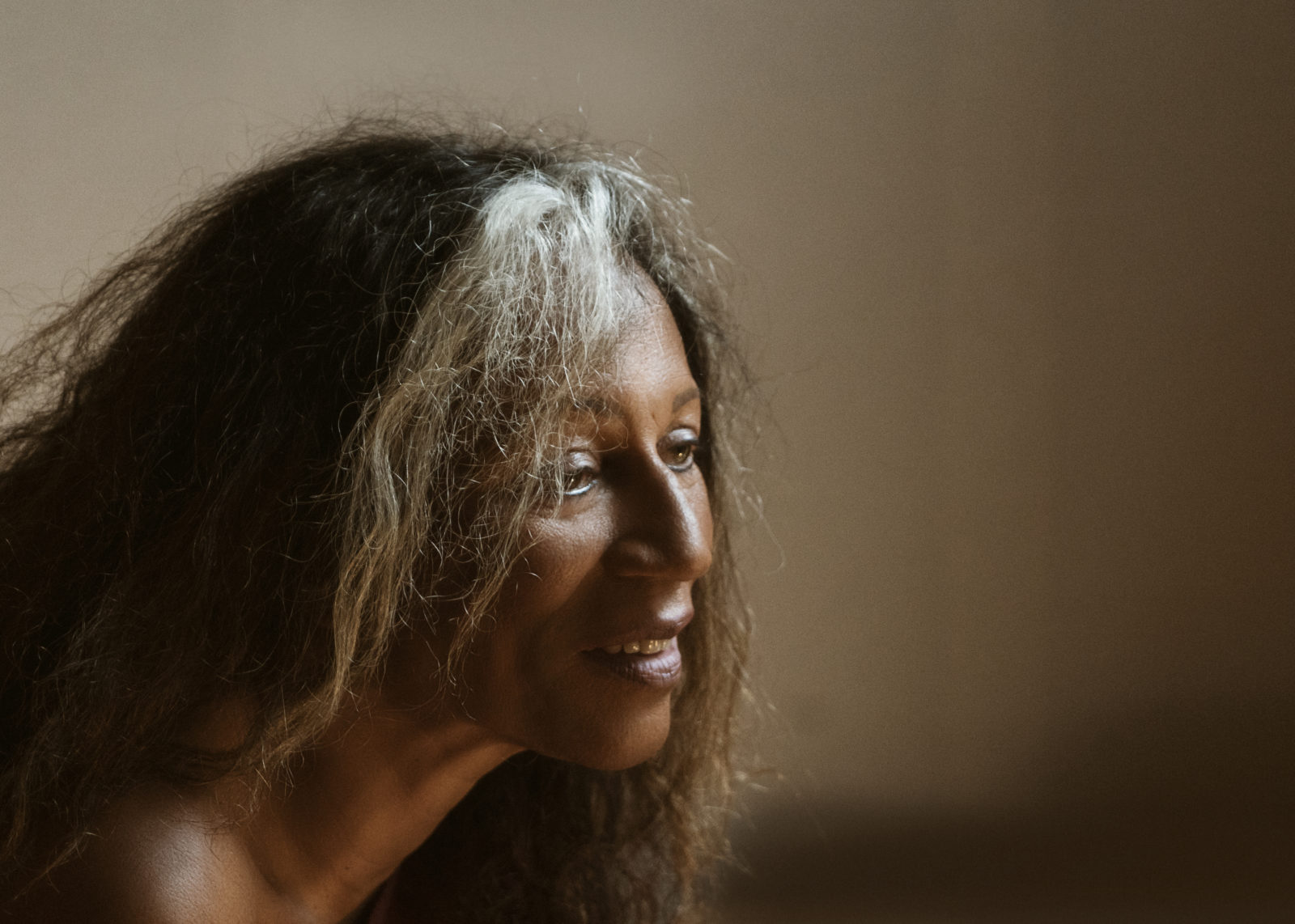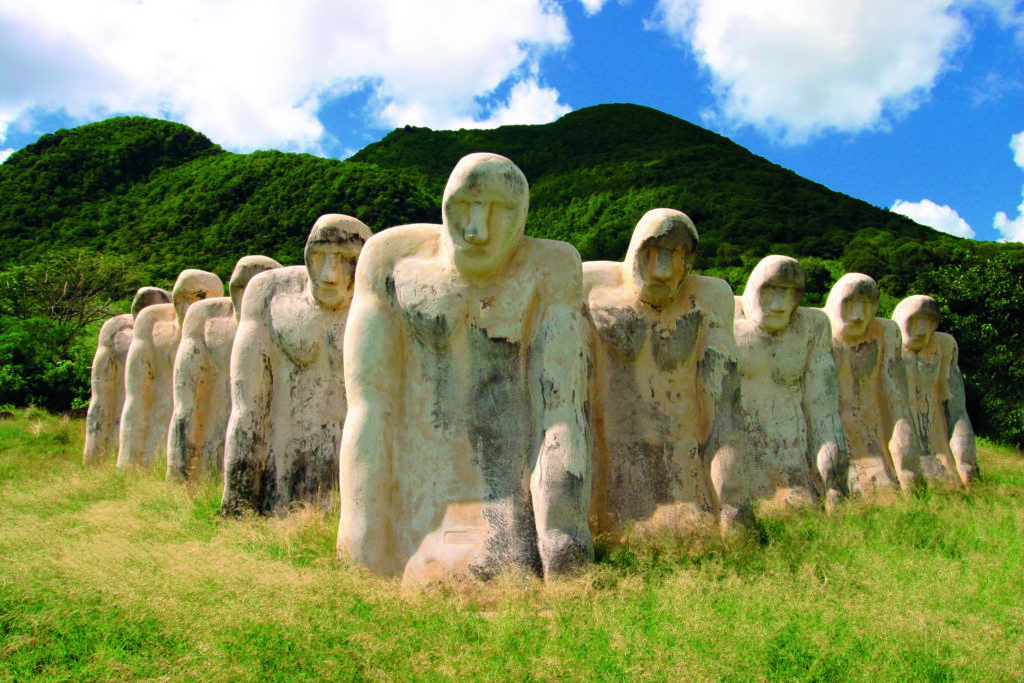
By presenting “Interviews With Aimé Césaire,” journalist and author Marijosé Alie shares with us her candid, truthful, and sometimes intimate encounters… This book, the only one of its kind, reveals the multi-faceted persona of Aimé Césaire, sensitive, witty, and kind, as few have done in the past. A sense of logic emerges over time, place, and roles played: a politician and a writer whose work was brilliantly beautiful and incisive… Aimé Césaire, forward-thinking, coherent, and free to be himself.

“… I was made to understand that before writing
a profile of Césaire, who was still shunned
by the media, I would be better off tackling
that of an important local socialist, Casimir
Branglidor, mayor of Trinité…”
ONAIR – Marjosé Alie, what motivated you to do your first interview with Aimé Césaire? Few would have understood the importance…
Marijosé Alie – I was sent to Burgundy because I was too independent in the world of public media, which at the time was under political control. When I came back at the end of the 70s, I wanted to give a voice to the political opposition, notably to Césaire whose opinion was, for me, seminal: I had read all of his work and asked myself how we could have such an important man amongst us without local journalists giving him the attention he deserved. He had a great reputation in Canada, in Africa, in the United States, and elsewhere, but in Martinique, his home, he was ignored, in any case by the official media.

OA – Why was he such a persona non grata?
MA – There was a neo-colonial climate that angered Césaire and he denounced it. He was elected mayor of Fort-de-France as a communist and was demonized for it. However, when he created his own political party, he engendered more dignity, autonomy, and respect. He created the SERMAC, a place which, for the first time, promoted the study of the tambour and its roots, painting… Yet his political stance was not widely embraced. The bourgeoisie was responsible for the making and unmaking of public opinion at the time, and they stood more to the right… there was something very assimilationist in the politics of that era. As for me, I was completely at odds with that world.
“… eventually we would have created
nothing other than good little French citizens
with black skin. Rather quickly we realized
the harmful nature of such an adventure…
and without disowning culture, by way of
French culture and universal culture, we
tried to find our worth and take possession of
ourselves.”
OA – You landed an interview in the library of the National Assembly, although Césaire stayed pretty clear of the media. What convinced him?
MA – He thought that all had been said in his writing and that interviews were not necessary. Yet I wanted him to tell me in his own words what he had wanted to write. That he represent himself. It was during a press conference in Martinique when I asked if I could see him again in Paris for an interview. He was an extremely polite man, and he said yes; not sure he thought I’d see it through. I believed that my request was proper to such a point, that I couldn’t imagine failing.
“ — Now, we can leave as we came, sir. I am
not lacking air, eight thousand kilometers in an
airplane at the taxpayers’ expense.
– Me, I know you because I have read all that you
have written…
I hand him a notebook. – In this notebook,
everything I have written since I was very young,
this is my universe. Do me the honor of reading
a few lines, if what you read makes me a terrible
person, I will go home, we can both go home…”
In this notebook, I thought about what it was to “be from Martinique,” resulting in an appalling, violent history: massacre of the Amerindians, slavery, two-tiered departmentalization… He saw in my writings a “healthy revolt,” and undoubtably sensed that I was not locked into a neo-colonial scenario. He would not have to go as far as he might with others at the time to find a common ground. So,
he accepted.

OA – There were a lot of additional interviews in the years to come. What impact did they have on you?
MA – He anchored my love for Martinique in reality by his words, impressions, and feelings. I went with him to different places, figurately. He was the first, for example, to tell me the story that many would later tell of the statues built by Laurent Valère at Diamant; those that illustrate slaves. that were swallowed by the sea. That story. fascinated him. For a long time, people had the impression that the color of their skin was a curse. Césaire lived in a Martinique that. refused his African origins. So, he felt that the people of Martinique had a need, not to “have” but to “be.”
“When I once said before General de Gaulle that
our history began in the hold of slave ships, it was
said that there were people from Martinique fully
assimilated, completely vexed, totally offended.
But that was the point, not to be ashamed, as
it was the truth. If anyone should be ashamed
it should be those who signed the treaty and not
those who were subject to it.”
OA – Today this sense of awareness seems to have taken hold. It is also rather explosive… How do you put into perspective what is happening now in the French West Indies, especially in Martinique, in terms of Césaire’s thinking?
MA – In our islands, there was a psychological massacre that until now provoked a lot of anger. Nothing was solved. We know our story, but to turn the page we would have to read it collectively. The descendants of slaves have an arduous job to do in terms of recovering the identity they tried to steal from us. We have proved to be incredibly creative and we are rich in literature, music, visual arts, and many other disciplines. We are a laboratory of peoples, a melting pot of humanity, and what we do with it is what matters. For decades we have been forcing open doors with our talents and we are making progress. Now we have to love ourselves. Since I was little, I have had the feeling that we are formidable as we survived the unspeakable. However, universality, room for communication, is not the end of the issue… We still have scores to settle and conversations to have, especially with the descendants of the colonialists.
“Senghor and I, we were on the university campus
and well, we were reading… Listen Léopold,
listen to that phrase, it’s fantastic! Hegel is
explaining that it is not by the negation of the
singular that we move toward the universal, but
that by deepening the singular we move toward
the universal… We were 20 years old!
– He looked at me. – No? – He rejoiced and
understood. – And I added with a little wink:
So the more we are Negroes,
the more we are men.”

OA – Today, is it still a question of better knowing yourself?
MA – The universality in the thinking of Césaire is fundamental. The planet is in trouble and that leads to withdrawal into one’s self. Nationalism is on the rise everywhere. However, I remain convinced that this phenomenon is just a footnote as the human being is formatted to have a collective intelligence. We are interdependent on one another like Edouard Glissant’s intelligent reflection on globalism. COVID was proof in the pudding: we are condemned to find common solutions.
“Many brilliant people, thinkers have dissected
his poetry, analyzed his theatre, studied his
career: my work is different. I intend to be
humble in writing this book. I only wanted
to share with as many people as possible,
this simple, modest man who hid behind an
incandescent pen.”
OA – What was the genesis of your book?
MA – It was the convergence of several things: during the lockdown I got a call from Eric de Lucy who gave me the idea, the desire to write about Césaire. I had the rushes from my interviews. Several of them had been broadcast. but I couldn’t really leave his words to the vagaries of television programs. Outre-Mer La 1ère and France 5 made available the documentaries I had done and I started to write. The book is for the general public: you can borrow it, re-read it, make it your own. I wanted it to be appealing and truthful: to approach the man as he was, with his tics, his smile, his sense of humor, sometimes offbeat. With the pandemic, all kinds of things were happening around me. And once again, Césaire did me a lot of good. I had the impression of knowing him even better. The compilation of souvenirs resulted in this “but yes, but of course” that made me want to reread that which I had already read from a different point of view.
“When Aliker, after presenting the long list of work
accomplished by Césaire, suggested that we honor
him in a tangible manner by naming the Lamentin
airport after him, Césaire, seated to his left, pouted.
He knew the secret of meaningful grimaces, that
was his clownish nature, this man of the theatre.
His body language alone was an entire conversation:
he raised his eyes to the heavens, he shook his head,
crinkled his eyelids, puckered his mouth as if to suck
his teeth in disgust, put his hands on his head as if
to say: they are crazy these Martiniquais.”
OA – We move away from our role of interviewer and take on that of critic to confirm that your book is indeed an intimate translation of Césaire’s thinking. We grasp it like a new quintessence, and we understand it, with a luminous clarity, a eureka, the coherence between the vision, the values, and the actions of a thinker, a writer, a politician, and a man, a simple yet great man.
MA – I wanted to actually be in the human dimension, the sense of meeting someone. That of a man who displayed an exceptional abnegation and put aside his ego for the benefit of his people. We had an extraordinary opportunity. Certain public figures have defined humanity—Jesus of Nazareth, Mandela, Buddha, Beethoven…. And being their contemporary allows you to enter into their. light. Aimé Césaire, a modest man, shy, yet who could “explode” with his pen, proving that one can be an important figure, all while remaining a gentleman. It is important to know to what point this modest and kind man hid behind a pen ten times larger than himself. People must understand that even if they sometimes feel small or uncertain, they are capable of making of making exponential leaps, like Césaire did. His profound thinking that the need to “be” Martiniquais was already the sign of an incredible destiny and an infinite possibility of creativity. I. believe that as well. I live it.
Interview by Agnès Monlouis-Félicité

